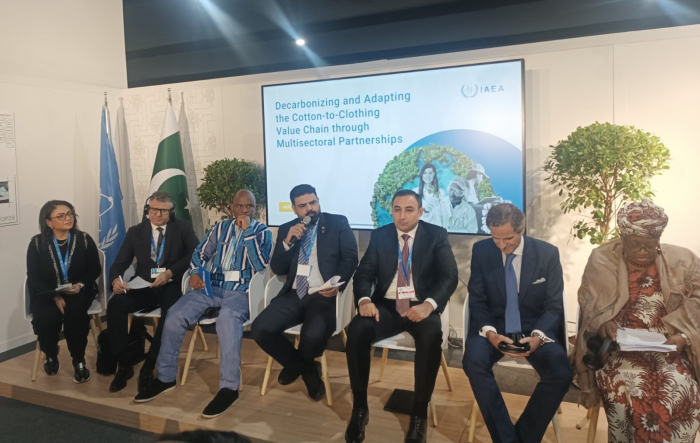Speakers highlighted while the global climate changes, cotton farmers globally, especially in developing countries vulnerable to extreme weather conditions, are facing unprecedented challenges and dealing with adverse impacts of climate change, particularly floods, heatwaves and droughts, AzVision.az reports.
They pressed on urgent need to build climate resilience of cotton farmers, particularly in resource-poor countries like Pakistan, Bangladesh and Egypt through transfer of technology and technical know-how for making cotton crop environmentally-sustainable and climate-resilient.
The event was jointly organised by the Ministry of Climate Change & Environmental Coordination, International Atomic Energy Agency (IAEA), Food and Agriculture Organization of the United Nations (FAO), United Nations Industrial Development Organization (UNIDO) and the World Trade Organization (WTO).
Addressing the event as keynote speaker, the parliamentary secretary Ahmed Atteeq Anwar at the climate change & environmental coordination ministry said that cotton is not only a key raw material for the global textile and fashion industries including in Pakistan, but it also provides income and employment for millions of farmers and raw material for textile sector worldwide. But, adverse fallouts shifting weather patterns, particularly recurrent floods, heatwaves and droughts are severely threatening the stability of cotton farming in arid and flood-vulnerable countries like Pakistan.
“Without immediate efforts to bolster farmers’ capacity to adapt to these changes, the consequences could be devastating for global supply chains, rural economies, and environmental sustainability,” he stressed.
Explaining further, the parliamentary secretary highlighted that the effects of climate change are already being felt in cotton-producing regions in a more devastating way. Farmers are grappling with prolonged droughts, shifting growing seasons, and unpredictable rainfall. In many areas characterised as arid countries, the frequency of extreme weather events such as floods and storms is increasing, further undermining the ability to grow cotton, endangering livelihoods of millions cotton farmers and workers in textile industry globally.
Director General of the International Atomic Energy Agency, Rafael Mariano Grossi highlighted during his address to the participants the importance of nuclear technology use in decarbonising and building climate resilience of the cotton crop.
He said nuclear technology offers innovative and effective solutions to decarbonise cotton farming and textile production while helping farmers adapt to the challenges posed by climate change.
“From providing low-carbon energy and improving water efficiency to enabling sustainable pest control and enhancing soil health, nuclear techniques can transform the cotton industry into a more resilient and eco-friendlier sector,” Rafael Mariano Grossi said.
He emphasised that as the world seeks to mitigate climate change and reduce carbon emissions, integrating nuclear technology into the cotton value chain can play an unprecedented role in achieving these goals while supporting the livelihoods of millions of farmers worldwide.
IAEA director general said further that nuclear methods could also be utilised to track water and soil pollution, helping cotton farmers and policymakers implement cleaner, more sustainable farming practices that protect local ecosystems and reduce the environmental impact of cotton production.
The nuclear techniques could also be used to measure and monitor emissions from cotton farming and textile production processes. This data is essential for identifying key areas where emissions can be reduced and for verifying the effectiveness of decarbonization efforts, he told the participants.
Ms Ngozi Okonjo-Iweala, Director General of the World Trade Organization, also spoke at the event. She said WTP soil mapping, a technique to identify and categorise the properties and distribution of different soil types in terms of its productivity, is crucial for adaptation of agricultural crops, particularly cotton, which is highly sensitive to rapidly shifting weather patterns. Because, it provides critical information about soil health, fertility, structure, and other physical and chemical characteristics.
“For decarbonising and adaptation of climate-vulnerable crops like cotton and maize, the importance of soil mapping cannot be overstated, particularly in agriculture, land management, environmental conservation and sustainable development,” he remarked.
WTO’s DG further highlighted that soil mapping can also help precisely pinpoint areas with soils that are better suited to withstand extreme weather events such as droughts, floods, or heavy rainfall, enabling farmers to choose more climate-resilient crops and practices.
Adopting science-based soil mapping techniques in agriculture is inevitable to mitigate agriculture sector’s carbon emissions and boost its resilience to climate shocks by dint of application precise adaptation technologies and techniques, she said.
Sarvan Jafarov, Deputy Minister of Agriculture from Azerbaijan, told the event’s participants that researchers and farmers in Azerbaijan are already implementing climate-smart agricultural practices based on nuclear and related techniques. As a result have been able to more than double their yields of cotton production in a project supported by the IAEA in partnership with FAO.
He apprised the participants that through the use of a new variety called “cotton super”, combined with carefully implemented climate-smart agricural practices which help to understand how to sustainably increase agricultural productivity, the pilot project has seen yields increase from the country’s average of three tonnes per hectare to eight tonnes per hectare.
Others who spoke at the event included, Mr Dicko Amadou, Deputy Minister to the Minister of Agriculture, Livestock and Water Resources from Burkina Faso; Mr. Ciyong Zou, Deputy to the Director General and the Managing Director of the Directorate of Technical Cooperation and Sustainable Industrial Development; Mr Nazeem Noordali, Chief Operating Officer of the International Islamic Trade Finance Coorporation and Ms. Imtinen Hamlaoui, Sustainability Manager from the ARISE group.
AzVision.az
More about: Azerbaijan COP29 Pakistan
















































